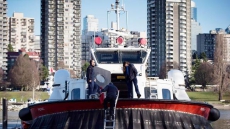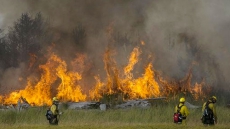VANCOUVER — There appears to be little relief on the way to help with this year's uncharacteristically early start to British Columbia's fire season.
BC Wildfire Service spokesman Kevin Skrepnek says cooler temperatures forecast for the coming days are unlikely to bring much rain and that worsening winds will likely only fan the flames.
Skrepnek says unseasonable dryness and heat across much of British Columbia resembles the situation in Alberta communities such as Fort McMurray, where tens of thousands of residents have been ordered to evacuate their homes after a firestorm descended on the northern oilsands city.
Since April 1, nearly 200 fires have consumed more than 230 square kilometres of land in B.C.
Of the more than 85 fires now burning across the province, 60 are located in the Peace Region where four evacuation alerts are in place, including a renewed alert for residents living near the 70 square kilometre Beaton Airport Road blaze, 50 kilometres northwest of Fort St. John.
The alert was issued late Tuesday afternoon, and is in addition to three others in the region affecting properties north and east of Fort St. John.
Virtually all of the fires so far this season have been cause by people, which Skrepnek says is typical for this time of year, which sees little lightning activity.

"What's exacerbating the situation here, particularly up in the Peace Region, is that we're in a bit of a period now where the snow has melted. So there's lots of dead grass, dead fuel on the ground," he says.
"And with it having been so dry that grass hasn't greened up yet, it's still dead, quite flammable, quite volatile."
There are few fire restrictions currently in place in B.C., with the only exception being a ban on open fires in the Prince George and Cariboo regions.
Skrepnek says Environment Canada expects this summer will be warmer than normal.
He says a big indicator for the coming fire season will be the amount of rain that falls from mid-May until the end of June.
Skrepnek says the so-called spring rains have a huge effect on fires, which can turn even a hot summer into a manageable firefighting season.


